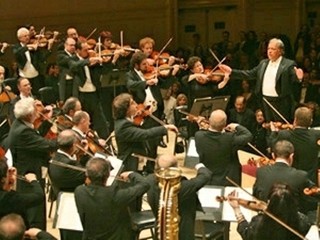|
Back
A Mehta-Physical Mahler New York
Issac Stern Auditorium, Carnegie Hall
11/05/2015 -
Gustav Mahler: Symphony No. 2 in C Minor “Resurrection”
Kristin Lewis (Soprano), Michelle DeYoung (Mezzo-soprano)
MasterVoices (formerly Collegiate Chorale), Israel Philharmonic Orchestra, Zubin Mehta Conductor/Music Director)

Z. Mehta, Israel Philharmonic (© Israel Philharmonic)
Truth is, that if Zubin Mehta had been conducting Gesualdo madrigals arranged for an orchestra of pennywhistles, kazoos and accordions, the audience in Carnegie Hall last night would have stood in adulation, roared bravoes and considered it one of the great concerts in history.
Such is the reputation of Music Director Mehta and the Israel Philharmonic Orchestra for New Yorkers. Mehta has been with the orchestra for almost 50 years now, has led them in peace and war, enjoying a relationship with an ensemble that itself is most unique. So if the full house celebrating the “35th Anniversary of the American Friends of the Israel Philharmonic Orchestra” was in such a festive mood, it would have been irrelevant what music was actually being performed.
Just to insure its success, though, both the Israel Phil and MasterVoices (the new name for the Collegiate Chorale) started with a rousing Star-Spangled Banner and an equally exciting Israeli National Anthem. After that, it was an easy course for the artists.
Fortunately, the music performed, Mahler’s Second, itself has a national anthem-like finale to ensure the bravoes. This was early Mahler, and while the first three movements were as challenging as his later work, most in the audience would remember that finale. The harmonies are simple, the songs are melodic, the solos and chorus are interrupted only for joyous orchestral interludes, and the effect is to move audiences profoundly.
Before this, though, it was up to Mr. Mehta to make the work believable. In the first movement, which could confuse audiences with its changes of gloom and exaltation, the conductor made it easy–though no less effective. It was taken at a good pace. The strings of the Israel could have had a gloomy start, but Mr. Mehta gave it such a jolting beginning that one had no time to think of despondency.
After this, the ascending notes, which Bruckner might have reserved for a finale, had a heavenly exaltation. And while the tempos changed, the experienced Mr. Mehta retained that volition, that sense of urgency with which the composer must have written it. He slowed down a bit just before those great crashing chords, but not for exploitation, simply to give those catastrophic moments more meaning.
From this movement on, the Israel Phil was absolutely transparent. I had never heard each instrument so clearly, listened to each of the two harps, as well as each of the large percussion ensemble.
There were several major faults here. Mr. Mehta conducted that Andante with a heavy hand. The tune is such a naive little number, virtually a children’s song, yet the orchestra, keeping the right moderate meter, drooped and sagged, gave gravitas to something which floats like a balloon.
Mahler himself described the second and third “interludes” as “a ray of sun”. Last night, clouds initially hid the sun, but by the third “calm flowing” movement, Mr. Mehta allowed all the radiance come through. Not a tropical sun, but the sun of a Viennese woods.
So enthralling was this that it came as a shock that he continued with the haunting mezzo-soprano song of the fourth movement without a break. And we needed those few seconds to get our breaths back. The song (which Mahler used in both song cycle and symphony) has simplicity, but Michelle DeYoung sung it with a haunting religiosity. This was not ethereal joy, it was spiritually moving.
I had seen audiences restless at the first three movements of the Second Symphony, but Mr. Mehta, with those few faults, never allowed the orchestra to be puzzling. It was an open, diaphanous orchestra, with nary an error. The offstage bands, the quirky flute and trumpet calls, the massive percussion sounds all held it together.

K. Lewis (© Kristin Lewis Foundation)
For the grand finale, few conductors can actually fail. Mr. Mehta, though, had the benefits of two splendid soloists, the well-known Ms. DeYoung and, to this listener, a new voice in Kristin Lewis, whose high notes were softly soaring.
With the MasterVoices, we had all the rounded grand big chorales which were necessary. Though I did feel a shock when Mr. Mehta ignored that two-bar rest between orchestra and the entrance of the chorus. To me, this is an essential hush.
Once MasterVoices, Misses DeYoung and Lewis came in, Mahler’s sense of devotion, exaltation and eloquence raised itself to the ceiling of Issac Stern Auditorium. True, few great conductors can actually fail here, but Mr. Mehta gave it that surplus treasure of ageless experience and innate drama.
Harry Rolnick
|